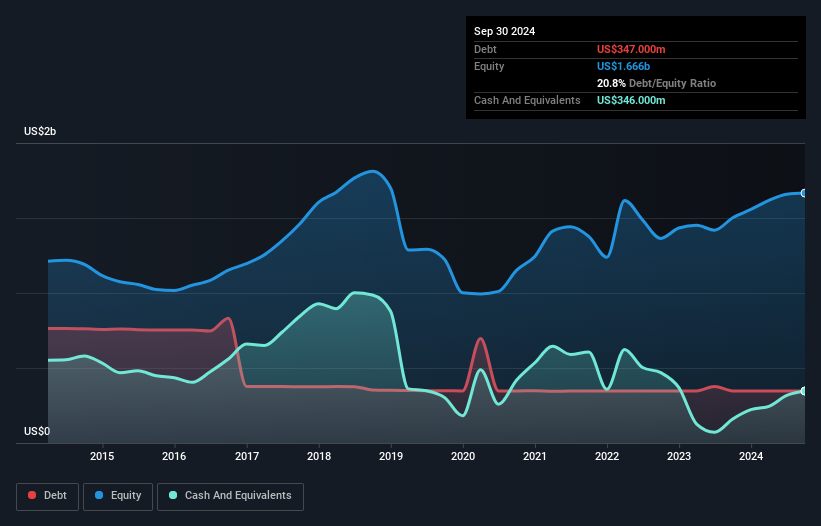- United States
- /
- Paper and Forestry Products
- /
- NYSE:LPX
Is Louisiana-Pacific (NYSE:LPX) Using Too Much Debt?

Howard Marks put it nicely when he said that, rather than worrying about share price volatility, 'The possibility of permanent loss is the risk I worry about... and every practical investor I know worries about.' So it seems the smart money knows that debt - which is usually involved in bankruptcies - is a very important factor, when you assess how risky a company is. Importantly, Louisiana-Pacific Corporation (NYSE:LPX) does carry debt. But the more important question is: how much risk is that debt creating?
When Is Debt A Problem?
Debt and other liabilities become risky for a business when it cannot easily fulfill those obligations, either with free cash flow or by raising capital at an attractive price. Ultimately, if the company can't fulfill its legal obligations to repay debt, shareholders could walk away with nothing. However, a more frequent (but still costly) occurrence is where a company must issue shares at bargain-basement prices, permanently diluting shareholders, just to shore up its balance sheet. By replacing dilution, though, debt can be an extremely good tool for businesses that need capital to invest in growth at high rates of return. The first thing to do when considering how much debt a business uses is to look at its cash and debt together.
See our latest analysis for Louisiana-Pacific
What Is Louisiana-Pacific's Debt?
The chart below, which you can click on for greater detail, shows that Louisiana-Pacific had US$347.0m in debt in September 2024; about the same as the year before. On the flip side, it has US$346.0m in cash leading to net debt of about US$1.00m.

How Strong Is Louisiana-Pacific's Balance Sheet?
We can see from the most recent balance sheet that Louisiana-Pacific had liabilities of US$303.0m falling due within a year, and liabilities of US$607.0m due beyond that. Offsetting this, it had US$346.0m in cash and US$136.0m in receivables that were due within 12 months. So its liabilities total US$428.0m more than the combination of its cash and short-term receivables.
Given Louisiana-Pacific has a market capitalization of US$8.19b, it's hard to believe these liabilities pose much threat. But there are sufficient liabilities that we would certainly recommend shareholders continue to monitor the balance sheet, going forward. Carrying virtually no net debt, Louisiana-Pacific has a very light debt load indeed.
In order to size up a company's debt relative to its earnings, we calculate its net debt divided by its earnings before interest, tax, depreciation, and amortization (EBITDA) and its earnings before interest and tax (EBIT) divided by its interest expense (its interest cover). The advantage of this approach is that we take into account both the absolute quantum of debt (with net debt to EBITDA) and the actual interest expenses associated with that debt (with its interest cover ratio).
Louisiana-Pacific has barely any net debt, as demonstrated by its net debt to EBITDA ratio of only 0.0015. Humorously, it actually received more in interest over the last twelve months than it had to pay. So it's fair to say it can handle debt like an Olympic ice-skater handles a pirouette. In addition to that, we're happy to report that Louisiana-Pacific has boosted its EBIT by 79%, thus reducing the spectre of future debt repayments. The balance sheet is clearly the area to focus on when you are analysing debt. But ultimately the future profitability of the business will decide if Louisiana-Pacific can strengthen its balance sheet over time. So if you're focused on the future you can check out this free report showing analyst profit forecasts.
Finally, a business needs free cash flow to pay off debt; accounting profits just don't cut it. So we clearly need to look at whether that EBIT is leading to corresponding free cash flow. In the last three years, Louisiana-Pacific's free cash flow amounted to 50% of its EBIT, less than we'd expect. That's not great, when it comes to paying down debt.
Our View
The good news is that Louisiana-Pacific's demonstrated ability to cover its interest expense with its EBIT delights us like a fluffy puppy does a toddler. And the good news does not stop there, as its EBIT growth rate also supports that impression! Looking at the bigger picture, we think Louisiana-Pacific's use of debt seems quite reasonable and we're not concerned about it. While debt does bring risk, when used wisely it can also bring a higher return on equity. Another factor that would give us confidence in Louisiana-Pacific would be if insiders have been buying shares: if you're conscious of that signal too, you can find out instantly by clicking this link.
Of course, if you're the type of investor who prefers buying stocks without the burden of debt, then don't hesitate to discover our exclusive list of net cash growth stocks, today.
New: AI Stock Screener & Alerts
Our new AI Stock Screener scans the market every day to uncover opportunities.
• Dividend Powerhouses (3%+ Yield)
• Undervalued Small Caps with Insider Buying
• High growth Tech and AI Companies
Or build your own from over 50 metrics.
Have feedback on this article? Concerned about the content? Get in touch with us directly. Alternatively, email editorial-team (at) simplywallst.com.
This article by Simply Wall St is general in nature. We provide commentary based on historical data and analyst forecasts only using an unbiased methodology and our articles are not intended to be financial advice. It does not constitute a recommendation to buy or sell any stock, and does not take account of your objectives, or your financial situation. We aim to bring you long-term focused analysis driven by fundamental data. Note that our analysis may not factor in the latest price-sensitive company announcements or qualitative material. Simply Wall St has no position in any stocks mentioned.
About NYSE:LPX
Louisiana-Pacific
Provides building solutions primarily for use in new home construction, repair and remodeling, and outdoor structure markets.
Outstanding track record with flawless balance sheet.
Similar Companies
Market Insights
Community Narratives




